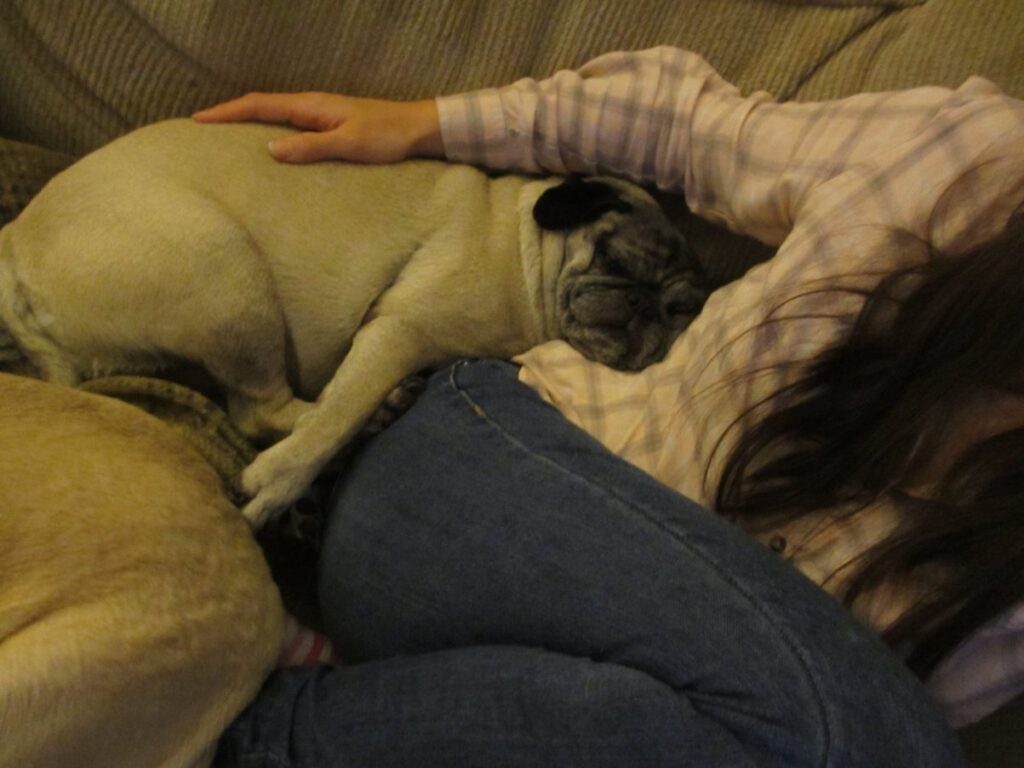
Pug Begging
Do Pugs Beg A Lot?
Pugs can be bad about begging compared to other dog breeds. However, how much they beg can have a lot to do with how you respond to their begging.
When we first got our pugs, I was amazed at how many sounds they make compared to other dogs. I have three posts about different noises pugs make! Pugs bawling, pugs crying, and pugs screaming like humans. Haha! Pugs aren’t usually bad about barking a lot. However, they are expressive in a lot of other ways, such as sighing and making other subtle sounds. For example, my pug Frank used to make soft sniffle-like sounds that we called his ‘purring’ when he was really happy.
Here is a video of my pug Frank begging to go outside.
Why Pugs Beg
Pugs beg because they want something, and think they might get it (or know they will!) if they beg. Quite simple, right? Depending on what they want, they may beg for all sorts of different things.

Why Pugs Beg For Food
Pugs beg for food because they are very food driven. It’s natural for all dogs to want food that they see or smell. Pugs are particularly excited by food, so that may lead them to beg for food more often than other dog breeds.

How To Train A Pug To Stop Begging
- Don’t Give In. Pugs beg because they think that it will get them what they want. If you give them what they want when they beg, it will teach them that begging is an effective way to get what they want, and they’ll continue to do it. On the other hand, if they are begging for something that is acceptable, it’s okay to give it to them. For example, in the video above where Frank was begging to go outside, I responded by taking him outside. I am 100% fine with him getting my attention by begging if he needs to go potty, so I don’t mind ‘encouraging’ that behavior by taking him out. However, if he were to beg for human food while I was eating, that would be a behavior I would ignore.
- Ignore. Pugs are very social creatures who want almost constant attention. Because of this, ignoring an undesired behavior can be really effective for pugs. They don’t like being ignored! Also, if you’re ignoring their begging then that means you aren’t giving in to it, so it won’t prove to be an effective way for them to get what they want.
- Avoid temptation. If your pug begs for the same thing regularly and it’s not something the dog needs to be around, it may be easier to just avoid letting your pug get tempted. For example, if your pug begs for your cat’s food, it may be easier to just keep your dog from being able to see the cat’s food bowl.
- Only feed them from their bowl. If you ever give your pug food from your hand, or from the kitchen floor, they will learn that food they see in your hand or in the kitchen may be theirs, sometimes. If you only ever feed them from your bowl (including putting any treats in their bowl) they’ll know that food is only theirs if it’s in their bowl. This can reduce begging when they see food in other places.
- Sit, stay command. Tell your pug to sit and stay to keep them away from temptation. For example, if they beg for human food when it’s your dinner time, tell them to sit and stay in the living room before leaving to eat dinner. If you haven’t trained your pug on those commands, it may be worth teaching them so that they can be used in these scenarios.
- Kennel them. If severe enough, you may need to remove your pug from a situation where they’re begging. If they can’t/won’t obey the sit/stay command, putting them in their kennel or otherwise leaving them in a safe, secure place away from temptation can be an option.
- Reward them for NOT begging. This can be a little tricky to do, but if your pug has a habit of begging in the same situation regularly, it may be possible. If your pug consistently begs for something and then stops – use that break in their begging to reward them! Of course, don’t reward them with what they are begging for. Rewarding them with rubs or ‘good girl/boys’ may be best. You want them to associate not begging with a positive reaction, to teach them that not begging is good.
- Be patient and consistent. Pugs can be challenging to train, but not due to low intelligence. They have pretty typical intelligence for dogs, but they are stubborn! This means that being patient and consistent with training is often the key to success.

Leave a Comment